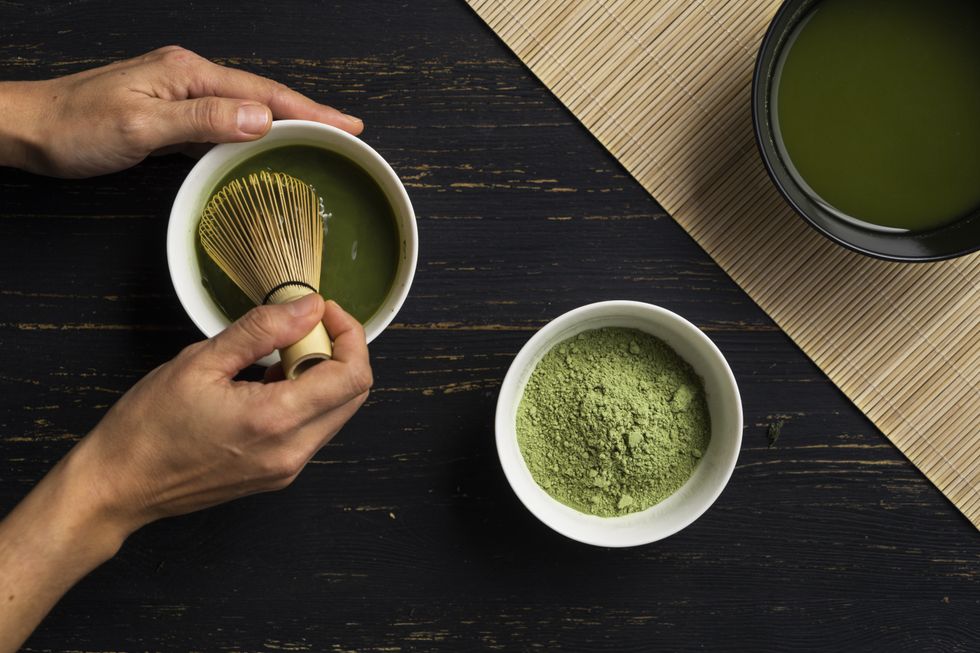Is matcha really that good for you? How to drink it safely for a healthier brain, weight and heart
While the Japanese tea has a myriad of benefits, it must be enjoyed in moderation
Don't Miss
Most Read
Matcha, one of the nation's favourite drinks, has emerged as a leading health trend in recent years – and for good reason too.
The health gurus at Holland & Barrett confirmed that the powdered green tea may improve attention span and cognitive performance, aid relaxation, assist weight management, boost heart and liver health, and lower cholesterol.
According to a study published in the National Library of Medicine, the Japanese powdered green tea "contains high amounts of substances with antioxidant and anti-inflammatory effects".
**ARE YOU READING THIS ON OUR APP? DOWNLOAD NOW FOR THE BEST GB NEWS EXPERIENCE**
"It has promising potential health benefits, mainly through a high concentration of catechins [a type of polyphenol packed with antioxidants]. With regular consumption, it may support the body's efforts to maintain health and prevent disease."
Adding to its many benefits, matcha is also gentler on the body than coffee.
"The main difference between matcha and coffee is that the former contains L-theanine, which can help with concentration, but without the energy slumps often associated with caffeine in coffee", explained dietitian Renee McGregor.
With its numerous health benefits and aesthetic appeal – taking social media by storm – it's understandable why so many are reaching for multiple cups a day. But are there any downsides?

'It has promising potential health benefits, mainly through a high concentration of catechins'
| GETTYMedical expert and registered dietitian Karina Tolentino has shared her research on this.
Ms Tolentino warned that matcha contains tannins and other compounds that can block iron absorption. While this is not a major health risk for most people, iron deficiency is a concern.
Tannins, a type of polyphenol that can bind iron in the digestive tract, make it harder for the body to absorb iron. This mainly affects non-heme iron (from plants), rather than heme iron (from meat).
A study published in the National Library of Medicine confirmed that green tea "interferes with iron absorption and can lead to iron deficiency anaemia when consumed in large quantities".
LATEST DEVELOPMENTS:

Matcha is considered a gentler alternative to coffee
| GETTYIt can be difficult to tell when someone is iron-deficient, but some early signs include fatigue, dizziness or lightheadedness, cold hands and feet, shortness of breath, brain fog, brittle nails, and headaches.
The NHS warns that untreated iron deficiency anaemia can have negative consequences, including a heightened risk of illness and infection, heart and lung complications, and complications for pregnant women before and after giving birth.
Drinking matcha in moderation is safe for most people, although certain individuals may be more at risk of iron deficiency than others.
These include pregnant or breastfeeding individuals, menstruating women, and vegetarians or vegans. This is due to a disruption in natural iron levels.
How can I drink matcha safely?
Luckily for matcha fans, the health gurus at Holland & Barrett confirmed that it's perfectly safe to drink it every day, although moderation is key.
They advised: "If you're pregnant or sensitive to caffeine, you should keep an eye on your consumption as it's relatively high in caffeine.
"Ingesting excessive amounts of green tea has been linked with toxicity, so you mustn't drink too much matcha, as it's a more concentrated version of green tea."
They added that excessive consumption of green tea may also affect blood-thinning medications, as well as the absorption of non-heme iron.
Experts also advise monitoring your sugar intake; as matcha is naturally bitter, it's often combined with sweeteners.
What if I have an iron deficiency?
Good news – you do not need to avoid matcha if you're iron-deficient.
Nutritional therapist Farzanah Nasser advised those impacted to incorporate more vitamin C-rich foods into their diets to improve iron absorption from non-heme foods.
The expert also recommended enjoying matcha between meals and steering clear of it when eating iron-rich plant-based feasts.
"Think of how most iron supplements contain vitamin C – the combination of the two helps with bioavailability, allowing your body to access the necessary nutrients," she told Vogue.
Although matcha has inhibitory effects if consumed in excess, its high antioxidant content, brain-boosting power, and heart and liver benefits make it a health beverage that's certainly worth trying.
Of course, if you have an iron deficiency or are at risk of developing it, speak to your GP before making any major diet changes.
Official guidance on iron deficiency anaemia is also available on the NHS website.








